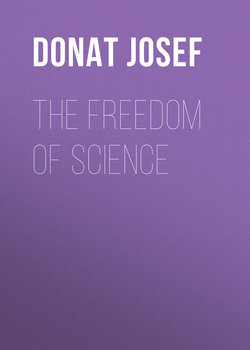Читать книгу The Freedom of Science - Donat Josef - Страница 17
Second Section. Freedom of Research and Faith
Chapter I. Research And Faith In General
Introduction
ОглавлениеWhen the youth growing to maturity begins to feel the development of his own strength, it may happen that he finds his dependence on home unbearably trying. Perhaps he will say, “Father, give me the portion of substance that falleth to me,” and then depart into a strange country.
The men of Europe have for centuries lived in the Christian religion as in their fathers' house, and have fared well. But to many children of our time the old homestead has become too confining. Modern man, we are told, has at last come to his senses. He wants to develop his personality, thoughts, and sentiments freely, independently of every authority. He turns his back on his father's house. His parting words are the accusation: The old Church “opposes the modern principles of free individuality, the right to drain the cup of one's own reason and personal life, and it sets itself against the whole of modern feeling, investigation, and activity” (Th. Ziegler, Gesch. der Ethik, II, 2d ed., 1892, p. 589).
We are already acquainted with this freedom. We approach now the main question: What is the true relation of the freedom, which man may rightly claim for his scientific activity and reason, to external laws and regulations? Is man really justified to reject them all on the plea that they degrade his intellect and are an obstacle to his development, or does this rejection but manifest an error into which his desire of freedom has decoyed him? This is the question, it will be remembered, that we reached soon in the beginning of our investigation. We have already found the categorical answer – an emphatic rejection of such justification; we also traced the hypotheses on which the answer rests. We now return to the question to discuss it in principle. We begin with the freedom of scientific research, in order to take up afterwards the freedom in teaching.
What are those external powers that may interrupt or caution the scientist in his investigations and problems? Here we do not yet consider the scientist as a teacher, communicating to the public the result of his investigation, his ideas and views, from the university chair to his scientific audience, or to a wider circle of hearers by means of publications; we here regard him in his private study only, in the pursuit of which he perhaps encounters new questions, and new solutions suggest themselves to him. What freedom can he and must he enjoy here? This private freedom must evidently be judged from a point of view other than that from which the freedom in teaching should be judged. With the latter, the interests of his contemporaries must be taken into account, and the question must be considered, whether they suffer by such teaching. The freedom of the scientist is greater than that of the teacher. Moreover, research is the principal and most important activity of science: nothing, surely, is taught that has not been previously investigated. If, therefore, research is in any way restricted, so also is teaching; but not vice versa. Are there, then, exterior authorities that may restrain research and reasoning, and what are they?
One who lives in the Christian world knows at once of what authority to think. It is not the state. The state cannot directly influence the private work of the student: if it may exert its influence directly upon anything, it is only upon freedom in teaching. No, the authority to think of is the authority of the faith, revealed religion and its guardian, the Church.
Of course, this is not the only authority. Even if a revelation from heaven had not been given us, yet those general convictions of mankind, common to all nations and times, of the immutability of the laws of thought and morality, of the existence of a supramundane God, of the retribution for moral conduct to be made in the world to come, of the sanctity of state-authority, of the necessity of private property, and others, would ever remain most revered utterances of truth. No one would be allowed to contradict this avowal of all mankind, relying on his own reasoning, which he calls science, and give the lie to the reasoning of all other men, in order to make his own reason the sole measure of truth.
But for the present let us pass over the natural authority of mankind, of its convictions and traditions. It is surpassed and replaced by the authority of faith which belongs to our Christian religion. The latter comes to us claiming to possess the only true view of the world, and laying upon us the obligation of accepting it. It has even the courage to put its anathema upon propositions which the scientist may call science; it dares write out a list of the propositions which it condemns as untenable. Against this authority the protest is raised: Where is freedom of research, if one cannot even indulge in his own ideas, if the intellect is to be cropped and fettered? What is to become of frank, unprejudiced investigation, if I am from the outset bound to certain propositions, if from the outset the result at which I must arrive is already determined? It is intellectual bondage that the man of faith is languishing in. Thus reads the indictment; thus sounds the battle-cry. Is the indictment justified? Can and shall science take faith as a guide in many instances without detriment to its own innate freedom? And where, and when?
First, the more general question: Is freedom of research compatible with the duty to believe, or do they exclude each other in principle?
